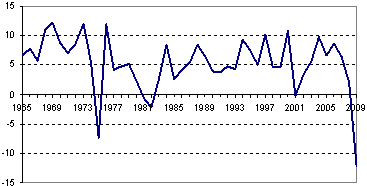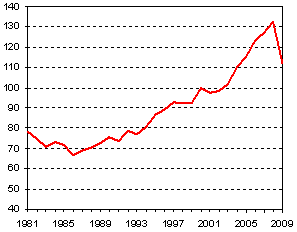The WTO has estimated that global trade would increase by 9.5 percent in 2010. Last year, trade plunged by 12.2%, the sharpest decline since the WWII. The last time global trade volume fell were in 1975 (-7%), 1982 (-2%), and 2001 (-0.2%). Trade in US dollar terms declined even higher (-23%) than in volume terms. Meanwhile, global output fell by 2.3% last year.

Volume of world merchandise exports, 1965-2009 (Annual % change)
Exports from developed countries are expected to increase by 7.5% in volume terms. Meanwhile, shipments for the rest of the world are expected to increase by 11%. This projection is based on the assumptions that global GDP growth would be 2.9% at market exchange rates and the will be stability in oil prices and exchange rates. The WTO warns that a 9.5% growth rate for trade is not sufficient to attain pre-crisis levels of trade volume next year. But, two years of growth at the same rate (12.2%) would surpass the peaks of 2008 for developing countries. The developed countries would require three years of growth at the same rate (9.5%).
The main reason for the sharp fall in global trade was a contraction in global demand. The complex web of supply chains led to a synchronized drop in trade across countries and regions. The source of all these: global recession triggered by the sub-prime mortgage crisis in the US

Ratio of world exports of goods and commercial services to GDP, 1981-2009 (Index 2000=100)
What could dampen the optimistic trade forecasts? The WTO lists increases in oil prices, appreciation or depreciation of major currencies, and additional adverse developments in financial markets as the possible factors that could dampen global trade. But, if the unemployment rates fall quickly, trade could recover faster than expected. [This is not going to happen though, according to economists such as Krugman and Stiglitz because the stimulus packages around the world have not been in proportion to the severity of the crisis.]